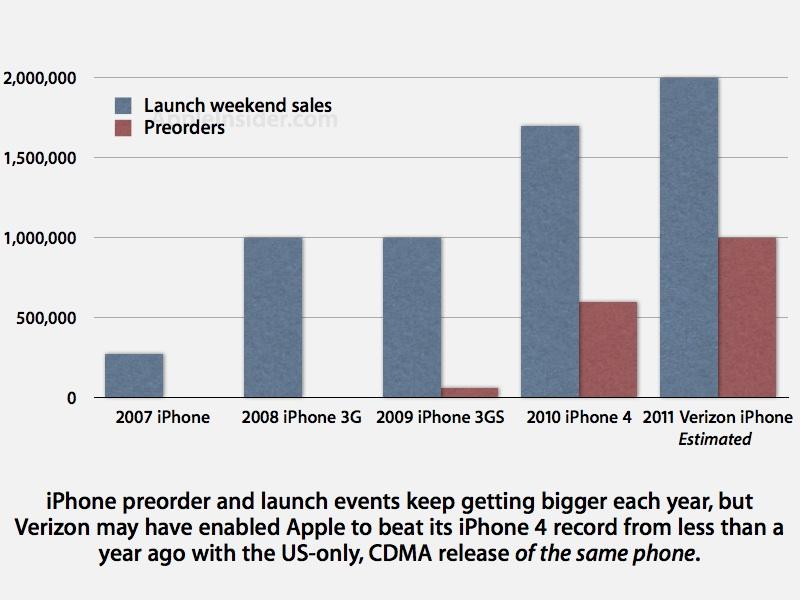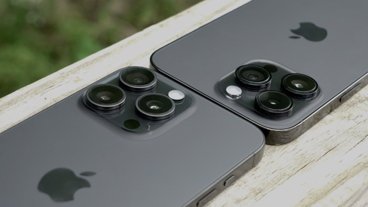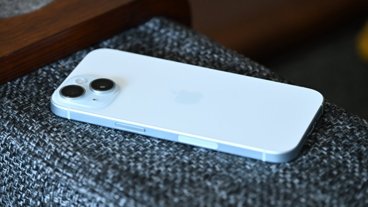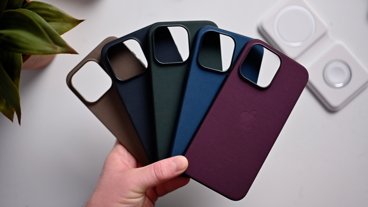Apple prepared 2 million Verizon iPhone 4 for preorders, retail [u]
This morning, Verizon Wireless announced that presales for iPhone 4 had exhausted the initial supply estimated to be available in its first day, and exceeded the carrier's previous sales records for phones such as the RIM BlackBerry Storm and Motorola Droid in just two hours, calling the sales "unprecedented." It did not say how many devices it had been allocated for these preorders however.
While the only figure floated by analysts so far has been 100,000 units (by Mike Abramsky of RBC Capital, on par with the first weekend of Verizon's sales of the Motorola Droid back in 2009), Ming-Chi Kuo of Concord Securities has indicated to AppleInsider that the number is likely to be much higher.
Based on discussions with component makers in Apple's supply chain, the analyst said Apple produced 2 million CDMA iPhone 4 units in December and January. Considering a ten day shipping delay to get these to US customers (the only market currently selling the CDMA version), the supply being fed to Verizon for preorders and for both Verizon and Apple retail stores on February 10 is expected to be in the two million range.
Philip Elmer-DeWitt of Fortune noted that Susquehanna analyst Jeff Fidicaro has estimated Verizon will sell 2.9 million iPhones before the end of March, which seems consistent with the production rates described by Concord Securities.
Did Verizon beat AT&T preorders using a year-old phone?
AT&T first day preorders for iPhone 4 last June, when the device was new, only amounted to 600,000.
That figure included initial manufacturing issues related with the new model (including Apple's failure to deliver white models as planned), and was also distorted by the complete meltdown of both AT&T's and Apple's online ordering systems. At the time, Apple noted in a press release that the total was "far higher than we anticipated, resulting in many order and approval system malfunctions. Many customers were turned away or abandoned the process in frustration."
In contrast, Verizon's preorder process was relatively smooth, in contrast to the frustrating AT&T launch, which dysfunctionally dragged on for hours before the company announced that its allocation of preorders had been sold out.
General launch still a week away
Last year, AT&T said preorder demand had been ten times higher than that of the iPhone 3GS in 2009. The subsequent iPhone 3GS launch sold more than a million phones in its first three days in 2009.
For comparison, the original iPhone launch moved 270,000 units, and took two and a half months to reach a million in sales in 2007 (at a much higher initial price), while iPhone 3G similarly hit one million in its first three days.
Last year's launch of the original iPhone 4 resulted in sales of 1.7 million in the first three days. At the time, the company's chief executive Steve Jobs said "this is the most successful product launch in Apple's history," before adding, "we apologize to those customers who were turned away because we did not have enough supply."
Supplies of the original iPhone 4 were constrained well beyond its launch; Apple stopped accepting launch preorders just a day after they became available. Apple was forced to temporarily suspend its toll-free number due to demand, and AT&T, the exclusive wireless carrier of the iPhone in the U.S., struggled to verify eligibility of its existing customers as the company's servers slowed to a crawl.
Verizon's actual iPhone 4 launch next week may likely be less problematic because it does not require global distribution across 87 countries that last years' launch of the GSM/UMTS iPhone 4 did. The model is also not new, but does serve a pent up demand among both Verizon users who have been waiting for an iPhone for four years, and AT&T users who desperately want an iPhone that works in their service area.
While analysts have consistently predicted the Verizon's sales will pale in comparison to AT&T's iPhone 4 sales over the last year, Apple may still be able to exceed its last year's launch of iPhone 4 this year with Verizon because of this pent up demand and its now well-honed manufacturing experience in building iPhone 4, following global sales over the last two quarters of more than 30 million iPhones, the majority of which have been iPhone 4 models.
At its official launch next week, Verizon said its new iPhone 4 would be made available at Verizon and Apple retail stores as well as Best Buy and Wal-Mart. Article updates and clarifications emphasized.
 Daniel Eran Dilger
Daniel Eran Dilger











 Marko Zivkovic
Marko Zivkovic
 Amber Neely
Amber Neely
 Christine McKee
Christine McKee
 Malcolm Owen
Malcolm Owen
 Mike Wuerthele and Malcolm Owen
Mike Wuerthele and Malcolm Owen

 William Gallagher
William Gallagher








